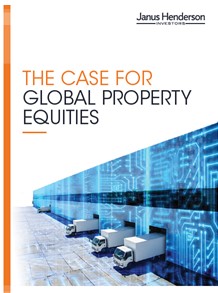The case for global property equities

1 minute read
Key takeaways:
- Listed property enables investors to benefit from global ownership of high-quality real estate assets with professional management platforms and daily liquidity. The majority of property income is derived from contractual leases, providing a high degree of certainty.
- Unlike fixed income, REITs can grow cash flows. Rental contracts are often linked to inflation, a key advantage when rates and inflation are rising.
- Over the longer term, listed property has delivered higher returns and low correlation compared to broader equities and bonds, offering an efficient way to diversify portfolios and potentially enhance risk-adjusted returns.*
*Nareit, FTSE EPRA/Nareit Global Index versus MSCI EAFE and Bloomberg Barclays Global Aggregate Bond Index, from February 2005 to December 2021. Past performance does not predict future returns.
Real estate is a continuously-evolving asset class. Structural trends are transforming certain parts of the market and leading some historically ‘core’ property types towards irrelevance. This underpins the need for an active and selective investment approach. This evolution gives rise to opportunities for investors to benefit from the ongoing divergence across property types, driven by secular themes such as changing demographics, digitisation, sustainability and the convenience lifestyle.
While not immune to the changing macroeconomic landscape, real estate has the ability to provide more dependable income streams, diversification benefits and the potential for inflation protection over time.
These are the views of the author at the time of publication and may differ from the views of other individuals/teams at Janus Henderson Investors. References made to individual securities do not constitute a recommendation to buy, sell or hold any security, investment strategy or market sector, and should not be assumed to be profitable. Janus Henderson Investors, its affiliated advisor, or its employees, may have a position in the securities mentioned.
Past performance does not predict future returns. The value of an investment and the income from it can fall as well as rise and you may not get back the amount originally invested.
The information in this article does not qualify as an investment recommendation.
Marketing Communication.
Important information
Please read the following important information regarding funds related to this article.
- Shares/Units can lose value rapidly, and typically involve higher risks than bonds or money market instruments. The value of your investment may fall as a result.
- The Fund is focused towards particular industries or investment themes and may be heavily impacted by factors such as changes in government regulation, increased price competition, technological advancements and other adverse events.
- This Fund may have a particularly concentrated portfolio relative to its investment universe or other funds in its sector. An adverse event impacting even a small number of holdings could create significant volatility or losses for the Fund.
- The Fund invests in real estate investment trusts (REITs) and other companies or funds engaged in property investment, which involve risks above those associated with investing directly in property. In particular, REITs may be subject to less strict regulation than the Fund itself and may experience greater volatility than their underlying assets.
- The Fund may use derivatives with the aim of reducing risk or managing the portfolio more efficiently. However this introduces other risks, in particular, that a derivative counterparty may not meet its contractual obligations.
- If the Fund holds assets in currencies other than the base currency of the Fund, or you invest in a share/unit class of a different currency to the Fund (unless hedged, i.e. mitigated by taking an offsetting position in a related security), the value of your investment may be impacted by changes in exchange rates.
- Securities within the Fund could become hard to value or to sell at a desired time and price, especially in extreme market conditions when asset prices may be falling, increasing the risk of investment losses.
- The Fund could lose money if a counterparty with which the Fund trades becomes unwilling or unable to meet its obligations, or as a result of failure or delay in operational processes or the failure of a third party provider.



